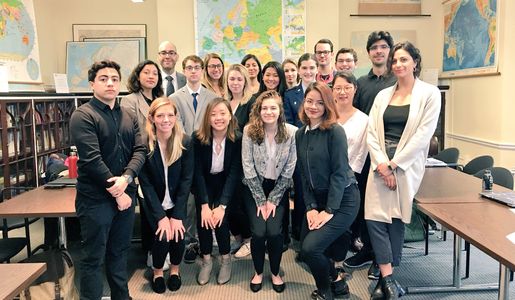Pardee School Students Participate in P5 Simulation Exercise
Students at the Frederick S. Pardee School of Global Studies at Boston University taking IR 300 “The Middle East and International Relations” participated in an April 25, 2018 in-class simulation that required them to strategize solutions to the Arab-Israeli conflict.
The class, which is taught by Pardee School Lecturer Jeffrey G. Karam, was divided into five groups representing the P5 — the five permanent members of the UN Security Council. Each group was tasked to prepare a strategy to on behalf of their country (United States, United Kingdom, China, Russia, and France) on the Arab-Israeli conflict, with each group nominating one student to deliver their memorandum to other members of the P5.
Students in my course ‘The #MiddleEast in #IR’ @BUPardeeSchool @BU_Tweets #BU are finalizing their strategies 4 the Team Simulation Exercise on the #Arab–#Israeli Conflict on April 25.
Stay tuned 4 updates from the P5 (#UK, #US, #China, #France, #Russia) on 4/25! #ActiveLearning pic.twitter.com/zlPUgFn42Z
— Jeffrey G. Karam (@JGKaram) April 23, 2018
“The team simulation was a very unique experience, especially working from the view point of a country that hasn’t been involved in the process,” said Ethan Sorcher (Pardee ’20). “It gives you another viewpoint to see how the Middle East plays a vital role in International relations.”
After all states presented their memos, the floor was open for rebuttals and counterarguments. Students were encouraged to ask: what could allow the Israelis and Palestinians to reach an agreement on their issues of difference? How can the P5 assist with encouraging the belligerent parties to negotiate more actively and thoroughly? How can international institutions foster cooperation between different Arab states, Israelis, and Palestinians? What should the P5 do to break the cycle of violence between Israelis and Palestinians?
“The simulation did an excellent job of highlighting present-day tensions between the U.S., Russia, and China,” said Avila Schickel (Pardee ’19) “A major concern raised in the simulation was China’s role in the conflict. China’s proposed resolution was met with skepticism from not only one, but multiple countries after having had no prior interest in the Arab-Israeli conflict. “
According to Karam, the exercise was modeled after the Council for Foreign Relations’ Model Diplomacy free programs and library of case studies.
“The exercise was extremely successful. I am very proud of my students for working hard to craft logical memorandums on such a complex issue like the Arab-Israeli conflict,” Karam said. “One the most remarkable features of the exercise was in the back and forth rebuttals and counterarguments between students representing their respective states. For a moment, the class reflected what realistically occurs at the UNSC, where the P5 can vehemently disagree with one another and seek to change topics when statements are not going their way. It is always inspiring to see how students incorporate different concepts and theories from the readings and lectures to prepare strong and clear strategies. It is intellectually satisfying to know that students have learned to use abstract concepts and theories as toolkits to respond to real-life problems and concerns.”
The exercise was intended to better prepare Pardee School students who intend to pursue careers either in government or with NGOs.
This is one of the most important goals for students majoring in IR at the Pardee School,” Karam said. “These students will someday join government and non-governmental institutions, and it is refreshing to see how they have been able to learn, discuss, and analyze the connections between IR and MENA Studies over the course of the term. Some of my students have not taken any IR or Middle East related courses, and now they are able to discuss some of the most pressing issues in the modern Middle East.”
